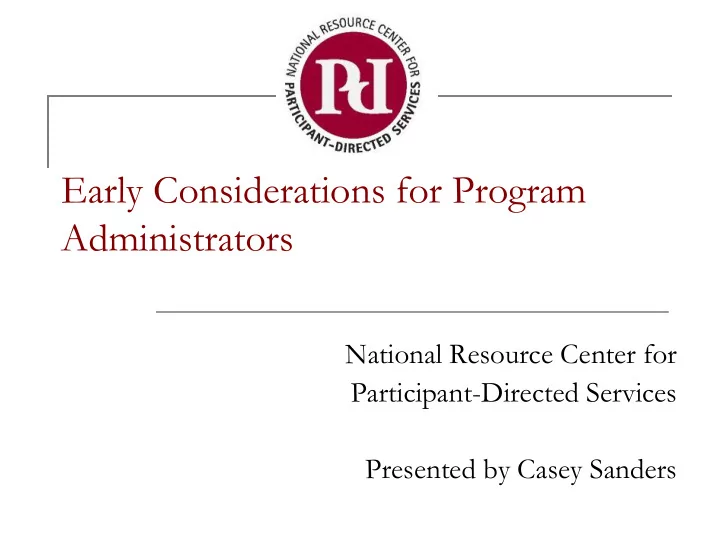

Early Considerations for Program Administrators National Resource Center for Participant-Directed Services Presented by Casey Sanders
Early Considerations State Laws and Regulations 1. Advisory Boards 2. Outreach and Social Marketing 3. Provider Resistance 4. 2
Review State Laws and Regulations Research potential limitations or areas of conflict with your existing state laws and regulations Status of employees Workers compensation State income Department of Labor regulations Nurse Practice Act Status of Employment regulations 3
Create a Partnership 4
Review State Laws and Regulations (continued) Identify your funding source and understand existing limitations and regulations Assess existing participant-directed programs Don’t think in terms Think in terms of of what you can’t do new opportunities 5
Creating an Advisory Board Participants Design and Implementation Development Participants Evaluation Management Participants 6
Advisory Group Members Program manager Representation from program stakeholders Participant-directed counselors Financial Management Services (FMS) staff Funder representative Participants Individuals who will be using the program Participant representatives Traditional agency providers as necessary 7
Advisory Groups (continued) Group size Design and Implementation Development Input throughout entire program cycle Plan to sustain and eventually replace group Evaluation Management members 8
Things to Consider Are you going to use an existing advisory group or create a new one? Will the group be formal or informal? What is the location for these meetings? How often will you meet? Will you offer a stipend to members? Will members be able to participate by phone or internet? What are the grounds rules? 9
Outreach and Social Marketing Educate and inform your community Gain buy-in and understanding Keep misinformation from breeding Promote and sustain participant direction Customize your message for the specific audience Cash & Counseling research results Communications Toolkit Staff training 10
Social Marketing Considerations: Informing Eligible Participants How will you inform potential participants? What is your eligibility pool? How will it be presented to participants? Who will present it? What will your program message look like? What types of conflicts will come up? 11
Marketing Materials Brochures Website Program Logo 12
Addressing Provider Resistance Important Messages: Participant direction and the traditional system are compatible The aging population is growing and there is a need for an expanded labor force There is a role for providers as a support entity in participant direction Some self-directing participants will still use their budget to purchase agency services Provider Resistance Toolkit 13
Advancing choice and control for people living with disabilities Please send your questions and comments to: info@participantdirection.org
Recommend
More recommend